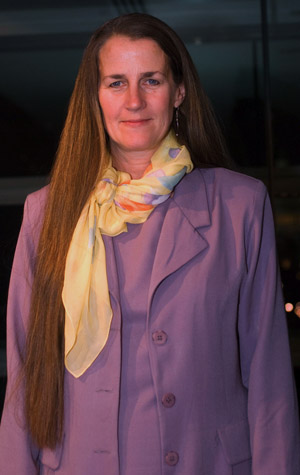Mary Caferro
Though scientists have not yet identified a genetic marker for community organizers, there’s no doubt that Mary Caferro inherited some valuable attributes when, as a child, she accompanied her jazz saxophonist father as he travelled to bars and factories in northwestern Montana organizing a trade union for roadhouse musicians.
After divorcing her abusive husband, Caferro moved with her four young children from their house in the country to an apartment in Helena. Caferro’s home daycare business did not bring in enough money so she also waited tables at a brew pub for minimum wage and picked up her sleeping children from nighttime care at one or two in the morning.
Having worked since the age of 12, Caferro was loath to go on welfare but the Montana Temporary Assistance to Needy Families (TANF) rules counted education toward mandated work requirements, enabling her to cut back her waitressing hours and take classes at the local university, where she worked toward becoming a teacher.
When the state considered disallowing education to count toward the TANF work requirement in 1999, Caferro joined a local advocacy organization, Working for Equality and Economic Liberation (WEEL), and personally lobbied 130 state legislators about the importance of education for lifting women out of poverty and off the welfare rolls.
Impressed by her skills, WEEL offered Caferro a job, first as a VISTA volunteer and then as a fulltime organizer, which allowed her to go off welfare in 2000. Two years later, Caferro joined hundreds of women who converged on Washington to oppose punitive changes being proposed for the re-authorization of TANF. Testifying against mandating marriage – a key part of the Bush-backed bill – Caferro spoke from painful personal experience: “Marriage promotion is not about solving poverty. It is about controlling women by using racist rhetoric and restrictive policy (while) turning a blind eye to the role (a bad marriage and domestic violence) play in destabilizing families.
In 2006, the WEEL board asked Caferro to become its executive director. Progressives in Montana also took note of Caferro’s success and suggested that she run for the state House of Representatives. She accepted the challenge. “I was afraid that if we had another Republican majority, the last programs for low-income Montanans would be cut. I wanted people to see me and say, ‘If Mary Caferro can run and win, I have a reason to continue to be part of the process.'”
Caferro has given folks that reason – and more. Working to ensure that those most affected by policies participate in shaping legislation and with an unusual ability to build coalitions across Montana’s peculiar political landscape, Caferro has racked up an impressive record of wins. She was instrumental in increasing the state’s minimum wage and, in the face of opposition from her own party leadership as well as the insurance industry, expanding the state’s CHIP program to cover 5,000 more low-income children. Caferro once got the chair of the appropriations committee to change his vote by placing a call to his wife. In the middle of an intense debate over the amount of assets allowed to children’s Medicaid recipients, a notoriously far-right colleague took her aside and told her, “I’ve been praying for your bill.”
While many nonprofits organized around welfare reauthorization in the 90s have disappeared, WEEL is thriving and will open a new office at the Blackfeet reservation near Helena. Caferro is considering running for state senate. As director of WEEL, as a state legislator and as a growing presence on the national scene, Mary Caferro will continue to fight to reduce poverty, not government assistance.
